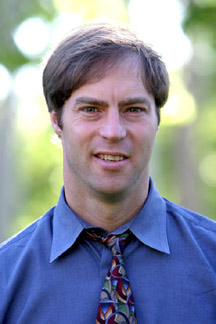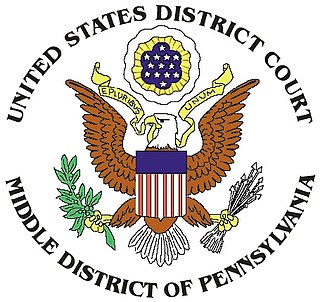Intelligent design (ID) is a pseudoscientific argument for the existence of God, presented by its proponents as "an evidence-based scientific theory about life's origins". Proponents claim that "certain features of the universe and of living things are best explained by an intelligent cause, not an undirected process such as natural selection." ID is a form of creationism that lacks empirical support and offers no testable or tenable hypotheses, and is therefore not science. The leading proponents of ID are associated with the Discovery Institute, a Christian, politically conservative think tank based in the United States.

Michael Joseph Behe is an American biochemist and an advocate of the pseudoscientific principle of intelligent design (ID).
Phillip E. Johnson was an American legal scholar who was the Jefferson E. Peyser Professor of Law at the University of California, Berkeley. He was an opponent of evolutionary science, co-founder of the Discovery Institute's Center for Science and Culture (CSC), and one of the co-founders of the intelligent design movement, along with William Dembski and Michael Behe. Johnson described himself as "in a sense the father of the intelligent design movement".
Project Steve is a list of scientists with the given name Stephen or Steven or a variation thereof who "support evolution". It was originally created by the National Center for Science Education as a "tongue-in-cheek parody" of creationist attempts to collect a list of scientists who "doubt evolution", such as the Answers in Genesis's list of scientists who accept the biblical account of the Genesis creation narrative or the Discovery Institute's A Scientific Dissent From Darwinism. The list pokes fun at such endeavors while making it clear that, "We did not wish to mislead the public into thinking that scientific issues are decided by who has the longer list of scientists!" It also honors Stephen Jay Gould. The level of support for evolution among scientists is very high. A 2009 poll by Pew Research Center found that "[n]early all scientists (97%) say humans and other living things have evolved over time."
The intelligent design movement is a neo-creationist religious campaign for broad social, academic and political change to promote and support the pseudoscientific idea of intelligent design (ID), which asserts that "certain features of the universe and of living things are best explained by an intelligent cause, not an undirected process such as natural selection." Its chief activities are a campaign to promote public awareness of this concept, the lobbying of policymakers to include its teaching in high school science classes, and legal action, either to defend such teaching or to remove barriers otherwise preventing it. The movement arose out of the creation science movement in the United States, and is driven by a small group of proponents. The Encyclopædia Britannica explains that ID cannot be empirically tested and that it fails to solve the problem of evil; thus, it is neither sound science nor sound theology.

Stephen Charles Meyer is an American historian, author, and former educator. He is an advocate of intelligent design, a pseudoscientific creationist argument for the existence of God. Meyer was a founder of the Center for Science and Culture (CSC) of the Discovery Institute (DI), which is the main organization behind the intelligent design movement. Before joining the institute, Meyer was a professor at Whitworth College. He is a senior fellow of the DI and the director of the CSC.

Darwin's Black Box: The Biochemical Challenge to Evolution is a book by Michael J. Behe, a professor of biochemistry at Lehigh University in Pennsylvania and a senior fellow of the Discovery Institute's Center for Science and Culture. In the book Behe presents his notion of irreducible complexity and argues that its presence in many biochemical systems therefore indicates that they must be the result of intelligent design rather than evolutionary processes. In 1993, Behe had written a chapter on blood clotting in Of Pandas and People, presenting essentially the same arguments but without the name "irreducible complexity," which he later presented in very similar terms in a chapter in Darwin's Black Box. Behe later agreed that he had written both and agreed to the similarities when he defended intelligent design at the Kitzmiller v. Dover Area School District trial.

The Wedge Strategy is a creationist political and social action plan authored by the Discovery Institute, the hub of the pseudoscientific intelligent design movement. The strategy was put forth in a Discovery Institute manifesto known as the Wedge Document. Its goal is to change American culture by shaping public policy to reflect politically conservative fundamentalist evangelical Protestant values. The wedge metaphor is attributed to Phillip E. Johnson and depicts a metal wedge splitting a log.

Of Pandas and People: The Central Question of Biological Origins is a controversial 1989 school-level supplementary textbook written by Percival Davis and Dean H. Kenyon, edited by Charles Thaxton and published by the Texas-based Foundation for Thought and Ethics (FTE). The textbook endorses the pseudoscientific concept of intelligent design – the argument that life shows evidence of being designed by an intelligent agent which is not named specifically in the book, although proponents understand that it refers to the Christian God. The overview chapter was written by young Earth creationist Nancy Pearcey. They present various polemical arguments against the scientific theory of evolution. Before publication, early drafts used cognates of "creationist". After the Edwards v. Aguillard Supreme Court ruling that creationism is religion and not science, these were changed to refer to "intelligent design". The second edition published in 1993 included a contribution written by Michael Behe.
The Kansas evolution hearings were a series of hearings held in Topeka, Kansas, United States from May 5 to 12, 2005 by the Kansas State Board of Education and its State Board Science Hearing Committee to change how evolution and the origin of life would be taught in the state's public high school science classes. The hearings were arranged by the Board of Education with the intent of introducing intelligent design into science classes via the Teach the Controversy method.

Kitzmiller v. Dover Area School District, 400 F. Supp. 2d 707 was the first direct challenge brought in the United States federal courts testing a public school district policy that required the teaching of intelligent design (ID), ultimately found by the court to not be science. In October 2004, the Dover Area School District of York County, Pennsylvania, changed its biology teaching curriculum to require that intelligent design be presented as an alternative to evolution theory, and that Of Pandas and People, a textbook advocating intelligent design, was to be used as a reference book. The prominence of this textbook during the trial was such that the case is sometimes referred to as the Dover Panda Trial, a name which recalls the popular name of the Scopes Monkey Trial in Tennessee, 80 years earlier. The plaintiffs successfully argued that intelligent design is a form of creationism, and that the school board policy violated the Establishment Clause of the First Amendment to the United States Constitution. The judge's decision sparked considerable response from both supporters and critics.

Neo-creationism is a pseudoscientific movement which aims to restate creationism in terms more likely to be well received by the public, by policy makers, by educators and by the scientific community. It aims to re-frame the debate over the origins of life in non-religious terms and without appeals to scripture. This comes in response to the 1987 ruling by the United States Supreme Court in Edwards v. Aguillard that creationism is an inherently religious concept and that advocating it as correct or accurate in public-school curricula violates the Establishment Clause of the First Amendment.
"A Scientific Dissent from Darwinism" was a statement issued in 2001 by the Discovery Institute, a Christian, conservative think tank based in Seattle, Washington, U.S., best known for its promotion of the pseudoscientific principle of intelligent design. As part of the Discovery Institute's Teach the Controversy campaign, the statement expresses skepticism about the ability of random mutations and natural selection to account for the complexity of life, and encourages careful examination of the evidence for "Darwinism", a term intelligent design proponents use to refer to evolution.
Edward Granville Sewell is an American mathematician, university professor, and intelligent design advocate. He is a professor of mathematics at the University of Texas, El Paso.

Uncommon Dissent: Intellectuals Who Find Darwinism Unconvincing is a 2004 anthology edited by William A. Dembski in which fifteen intellectuals, eight of whom are leading intelligent design proponents associated with the Discovery Institute's Center for Science and Culture (CSC) and the International Society for Complexity, Information and Design (ISCID), criticise "Darwinism" and make a case for intelligent design. It is published by the publishing wing of the paleoconservative Intercollegiate Studies Institute. The foreword is by John Wilson, editor of the evangelical Christian magazine Christianity Today. The title is a pun on the principle of biology known as common descent. The Discovery Institute is the engine behind the intelligent design movement.
Truth in Science is a United Kingdom-based creationist organisation which promotes the Discovery Institute's "Teach the Controversy" campaign, which it uses to try to get the pseudoscientific concept of intelligent design creationism taught alongside evolution in school science lessons. The organisation claims that there is scientific controversy about the validity of Darwinian evolution, a view rejected by the United Kingdom's Royal Society and over 50 Academies of Science around the world. The group is affiliated with the Discovery Institute, the hub of the intelligent design movement, following its strategy and circulating the Institute's promotional materials.
The level of support for evolution among scientists, the public, and other groups is a topic that frequently arises in the creation–evolution controversy, and touches on educational, religious, philosophical, scientific, and political issues. The subject is especially contentious in countries where significant levels of non-acceptance of evolution by the general population exists, but evolution is taught at public schools and universities.
The Discovery Institute has conducted a series of related public relations campaigns which seek to promote intelligent design while attempting to discredit evolutionary biology, which the Institute terms "Darwinism". The Discovery Institute promotes the pseudoscientific intelligent design movement and is represented by Creative Response Concepts, a public relations firm.

Biology for Christian Schools is a 1991 school-level biology textbook written from a Young Earth Creation point of view by William S. Pinkston and published by the Bob Jones University Press. The book has been controversial because it espouses the idea of Biblical inerrancy; that whenever science and Christianity conflict, the current scientific understanding is wrong. The book promotes creationism, which is rejected by the National Academy of Sciences, the National Association of Biology Teachers and the National Science Teachers Association who state creationism and intelligent design are pseudoscience.
The relationship between intelligent design and science has been a contentious one. Intelligent design (ID) is presented by its proponents as science and claims to offer an alternative to evolution. The Discovery Institute, a politically conservative think tank and the leading proponent of intelligent design, launched a campaign entitled "Teach the Controversy", which claims that a controversy exists within the scientific community over evolution. The scientific community rejects intelligent design as a form of creationism, and the basic facts of evolution are not a matter of controversy in science.









